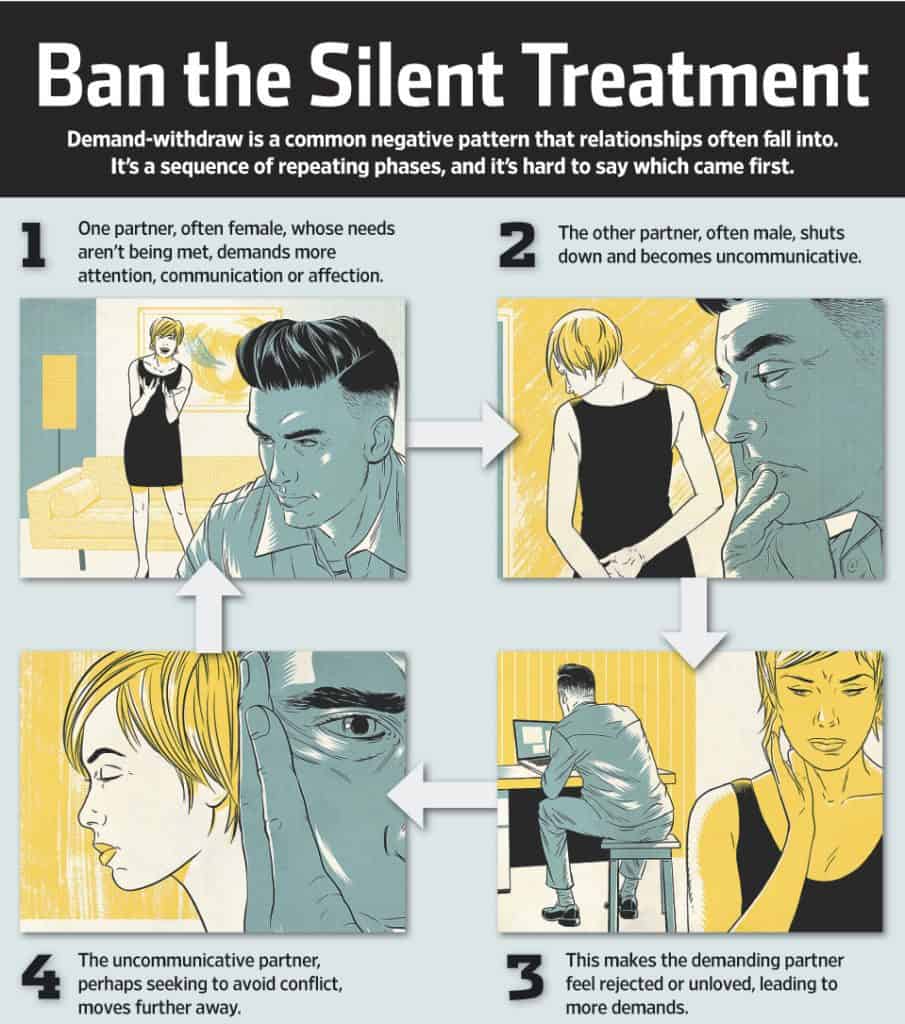My marriage almost fell apart in 2013 after I cheated on my wife. So I wanted to share all the steps to save a marriage after infidelity that worked for my wife and me.
To save a marriage after infidelity, there has to be complete honesty from the cheater as rebuilding trust is the #1 priority. They also need to cut all contact with the 3rd person, consider therapy to work on their own issues, and understand that the healing their spouse has to go through will take time.
We all know life happens and people aren’t perfect.
No matter how harmonious your relationship is and no matter how well-meaning a partner is, infidelity can happen. Every marriage will go through struggles and challenges. For many couples, the biggest struggle they will face is when one spouse cheats on the other.
I don’t want to diminish the significance of the damage caused by cheating. But it is possible to save a marriage after infidelity. In fact, surviving it often sees the relationship come out stronger and better for both partners.
It is possible to save a marriage after infidelity and in this post, we explore EXACTLY how to do that.

What is cheating in a marriage?
By definition, cheating in a marriage or relationship is when one person violates the agreements they have made with their partner.
Depending on the nature of the relationship, that could be actual sex, but it could also include any of the following depending on what things the couple has decided are acceptable:
- Heavy flirting with others
- Any type of physical affection with another
- Emotional affairs
- Texting with ex’s
Of course, some couples might also include going to strip clubs as a violation of their agreement.
One of the biggest problems couples face is a lack of clarity in what is or isn’t acceptable. After all, while almost all couples would agree that it’s not acceptable for the other to have sex with someone else, sometimes it’s not that clear-cut.
What about a kiss, or exchanging phone numbers, meeting an attractive co-worker out for a drink after work, or just confiding in someone else of the opposite (or same sex for gays and lesbians)?
Then what about porn, strip clubs, or just plain old flirting?
When couples never discuss any of those things and their views, it can lead to confusion later when 1 spouse thinks something is acceptable and the other doesn’t.
The other way couples get in trouble is when 1 spouse is convinced that their view is the only acceptable view. That can push the other spouse to do things in secret.
For example, I have a number of male friends who would never tell their wives if they were going to a strip club.
That’s because they have decided by themselves that this behavior is OK, and either they haven’t consulted their spouse, or the spouse has also decided unequivocally that doing that is NOT OK.
I can pretty much guarantee their marriage would last longer if they simply discussed their feelings on that with each other with an open mind and reached an agreement.
Money on the Street Interviews: Is Financial Infidelity Just as Bad as Cheating? https://t.co/j4rncxMUuj
— Credit Innova. Group (@CreditIGroup) October 23, 2017
What are the different types of cheating?
Cheating is one of the Top 3 Reasons for Divorce (click to read my article that breaks them down). So while this is an extremely serious situation, you CAN fix this. You can move past it and have a better marriage after infidelity.
While any kind of cheating is terrible, there IS a difference between someone who cheated with 1 person and someone who is a serial cheater with multiple relationships.
Being cheated on is never fun (been there, done that).
But when your partner has cheated on you repeatedly with multiple people, in some ways that feels worse than a 1-time affair. This person is seemingly incapable of being monogamous.

And they aren’t just causing injury one time; they are repeating the offense over and over again.
But then the cheater who had an intentional ongoing affair with just 1 person obviously has an emotional attachment likely missing from the serial cheater.
Then there’s also cheating that is purely emotional where nothing physical happened.
Thus we have to come to the inescapable conclusion that all kinds of cheating devastate our partners, but for wholly different reasons.
But with effort, dedication, and transparency, in either case, it IS possible to save a marriage after infidelity.
Is porn virtual infidelity?
I pondered this question recently as I noticed a post in a Facebook marriage group I am part of where a woman proposed that her husband was cheating because he looked at porn.
No matter what one thinks of porn or its place in a marriage, there’s really no denying that this doesn’t meet the definition of cheating. Of course, I suppose if it involves some sort of live chatting with a real person that’s different.
But in most scenarios, people look at pictures or videos online and don’t actually engage in an exchange with another person.
To cheat, a person is physically connecting with another outside their primary relationship without their partner’s knowledge and consent. Or, they are connecting on a deep emotional level with another that goes beyond the platonic.
Either way, looking at porn on a computer screen or TV, where no physical or emotional connection is possible, just doesn’t meet that test.
Again, whether porn is a healthy part of a relationship or not, is for a different blog post.
Cheating, plain and simple, is connecting sexually or intimately with another without your partner’s knowledge and consent. Sometimes that connection is purely physical. Other times it’s emotional. And occasionally it encompasses both.
What is considered emotional infidelity?
Sometimes cheating takes on something other than just a physical act.
It could be just an emotional connection between 2 people outside the primary relationship. Or it could be the combination of the emotional and the physical.
My wife is of the opinion that an emotional connection is worse than just physically cheating on your spouse.
You see when someone confides in someone else, they are forming an emotional bond.
There’s a level of intimacy that grows that goes way beyond just physical gratification. This person becomes the one they let their guard down around. The person to cling to in the storm; the one with whom they share their innermost feelings.
It also goes without saying that this person can often become the one who the would-be cheater complains to the most about their spouse.
For this reason, I agree with my wife; this is a worse form of cheating than something purely physical. The cheater is replacing all of you; not just the part that satisfies a sexual urge.
And while I’m not so old-fashioned as to say men and women can’t be friends with the opposite sex (or same sex for gays and lesbians), I do think it’s good to have clear boundaries with our friends.
I also think it’s critical that we aren’t complaining about our spouse or relationship to another where those lines could possibly get blurred.
How do I save my marriage if I cheated?
In my own marriage, I have been the cheater. I’m not proud of that and it’s not easy to say. But I’d be a hypocrite to write a post about it and not bring it up.
In a previous relationship, I also felt the sting of being cheated on, so I can relate to both sides of this issue.
Thankfully when I cheated on my wife wasn’t recent (2013).
I’m happy to report that my wife and I did indeed save our marriage after infidelity. And in almost every way, our marriage today is stronger, healthier, and happier than it ever was in the prior 12 years we’ve been in a relationship.
We also welcomed our 3rd child in late 2017. So just know that everything I walk you through on this post is very real to me, very personal, and something I can relate to 100%.
How do I get over the guilt of cheating?
I’ll be honest. The guilt I felt after cheating was incredible.
I could see the pain on my wife’s face and the confusion on my daughter’s faces. I knew I was the cause of that pain and confusion.
But I also know and believe that we can’t live in the past or the future. We have to be present to where we are right here and now.
So I knew that guilt and regret in and of themselves don’t provide any benefit. But I also knew that promises to my wife were meaningless too since I had already destroyed her trust in me.
So while I was humble, I didn’t grovel or beg.
Instead, I simply focused on being the best version of me I could be. I worked hard every day to be open, honest, transparent, and accountable.
When my wife needed to vent or express her feelings to me about what I had done, I let her, even when it was the thousandth time I heard it.
I knew I had to show her I was capable of changing and being the man she fell in love with again, and then just allow her to go through the process of working through her feelings, learning to trust me again, and falling back in love with me.
How do you save a relationship after cheating?
Full transparency and humility here is the key to save a marriage after infidelity.
The cheater has to realize that no matter what their spouse was doing (or not doing) nothing justifies the cheating. I don’t care if they were withholding sex, had gained 50 lbs or constantly badgered and berated you. Cheating is never justifiable.
The relationships that don’t survive an affair are almost always ones where the cheater somehow feels like the affair was justified. They won’t come out and say it point-blank. But you’ll hear statements like “yes, it was wrong, but . . . ”
Let me be brutally honest. Any apology that includes a “but” isn’t an apology.
So in order to save a marriage after infidelity, the cheater has to earn their spouse’s trust back. That’s not easy and it’s not quick. It may take years.
The cheater can make this process easier by:
- Going overboard on communicating your whereabouts when not at home or work
- Share your email and social media passwords with your spouse
- Show your phone screen to your spouse anytime you get a call or text, especially at night
That may feel like you’re living under house arrest. But you are! That’s the house you built.
While it almost always takes 2 to derail a marriage, If you cheated, this is the price you pay to save a marriage after infidelity.
Accept it, do it humbly or throw in the towel now, but this is a critical step towards a better marriage after infidelity.
Zero Tolerance Policy with the 3rd person

Of course, it also goes without saying that the cheater has to completely, 110% cut off all contact with the person they had the affair with.
If that person is a co-worker, it means changing jobs.
It may also mean getting a new phone number & email address. It likely means blocking them on social media. We are weak creatures. Men and women don’t always have the strength to fight temptations.
We have to remove every possible means by which we might reach out in a moment of weakness. Nor can we allow them a means to reach out to us in their moment of weakness.
Let me be clear here: you cannot have any contact with the person you had the affair with if you have any hope of saving your relationship.
If you aren’t willing to do whatever it takes to ensure that, this won’t work.
Does marriage counseling work after infidelity?
One thing that can definitely help is marriage counseling.
I’m of the opinion that therapy is good anytime, crisis or not. But to save a marriage after infidelity it can be incredibly helpful.
If you’re wondering Can Marriage Counseling Help? (click to read my article to find out), I have a post that addresses just that.
Marriage counseling allows both people a neutral and safe space to talk about their feelings.
The therapist doesn’t take sides. But they will interpret what one spouse is saying to ensure that the message is heard by the other spouse.
They also play back what is being said as sometimes we don’t always say what we mean in the heat of the moment. It is undoubtedly one of the key steps to have a better marriage after infidelity.
What if my spouse doesn’t want to save the marriage?

In the early stages after the infidelity comes out the partner who was cheated on may not be sure they want to fix it.
After all, their whole world just got turned on end. They may have friends or family members telling them to clean out the bank account, grab the kids and head out.
And friends or family who is pushing you to be vindictive are not what you need at that moment. They may be well-meaning, but that’s not true support.
In that state of mind, no matter what the crisis, we simply aren’t level-headed. We don’t make decisions that are necessarily best for the long term. In short, we’re being reactionary.
As with any decision that is changing the rest of your life, you want to come at it with a clear head, carefully weighing the pros and cons.
If the cheated needs time away to sort through their feelings, let them. When a cheater tries to strong-arm a partner into staying through guilt or pressure, that’s almost never going to work.
So sometimes to save a marriage after infidelity we have to let go.
What percentage of marriages survive infidelity?
In looking at the hard cold facts, according to Trustify,
- Over 33% of marriages encounter cheating
- 22% of men cheat on their significant other
- 14% of women cheat on their significant other
- 36% of cheaters admit to having an affair with a coworker
- People who have cheated are 350% more likely to cheat again
- Affairs are most likely to occur two years into a marriage
- 35% of cheaters admit to cheating on a business trip
- 10% of affairs begin online
- 40% of the time online affairs turn into real-life affairs
Dive in deeper in one of my newer posts that looks at 17 astonishing Infidelity Recovery Statistics (click to see my complete list) and explore what the odds are to save a marriage after infidelity.
Can marriage be saved after infidelity?

Understand that an affair does incredible damage. It destroys trust, but it also can decimate your partner’s self-esteem and feelings of self-worth.
Believe it or not, it also has an incredible impact on the cheater’s self-esteem.
After all, while the cheater is the one who “wronged” the marriage, only the most heartless cheater isn’t filled with guilt and remorse over their actions. Thus, the affair damages the cheater too.
All of that has to be rectified in saving the marriage after infidelity.
In addition, however, the roots of what caused the affair have to be addressed too. After all, when we don’t learn from our mistakes, we’re destined to repeat them.
Learn more about How Couples Counseling Works at this great post over at BetterHelp.
Why do happy spouses cheat?
While some marriages no doubt do end up with infidelity because the couple isn’t happy, MANY so-called happy spouses cheat too.
In most cases, people don’t cheat because they aren’t attracted to their spouse or because their marriage isn’t happy. In some cases, the marriage isn’t happy, but oftentimes the root of both is something else entirely.
With my own case, my Mom and Dad split up when I was 6 months old and I rarely saw him consistently until I was an adult; a story I detail in my most popular post called Growing Up With a Gay Father (click to read my article).
He then passed away in 2014.
I also grew up with an Alcoholic Step-Father (click to read my article) who I moved away from when I was 10 when my mom left him. He then died when I was in high school.
Despite his alcoholism and what he did to my Mom (some of which I witnessed), I still loved him very much and called him Dad until his passing.
I say all that not for sympathy or to make excuses.
But I had to come to terms with the underlying feelings of not being worthy enough. All the important people in my life left me at one point or another.
While logically I can understand “the why”, emotionally I felt unworthy.
How your past can affect your future and your present
Because of my childhood fear of abandonment, in almost all of the relationships I’ve had as an adult, I left first or initiated a preemptive strike.
I left or sabotaged the relationship before it left me.
I had to really understand my past and work on that or I was destined to keep repeating my same mistakes and patterns.
If you struggle to Let Go of the Past (click to read my article) as I did, I strongly urge you to take a moment and read my post on that subject. We all have past issues and learning how to not let them control our present and future is crucial for our ability to survive and thrive!
So one of the keys to a better marriage after infidelity is to really understand the issues in our past that drove our decisions.
Does cheating mean you’re not in love?
No is the short answer.
It doesn’t mean that at all, necessarily. If I’m being brutally honest, I was drawn to the other woman in part because she reminded me of my wife’s energy before marriage, kids, and careers dulled our passion.
But I was also drawn because my wife and I’s relationship had deteriorated due to a lot of what Dr. John Gottman calls the Four Horsemen (click to read my article).
These 4 behaviors are the 4 worst marriage-destroying behaviors you should avoid at all costs.
Lastly, I was drawn to her because as I said above, it was my pattern to self destruct my relationships out of a fear of being abandoned. I know that’s ironic, but if I sabotaged, at least I was in control.
But I was never actually not in love with my wife.
I just didn’t know how to get past the damage we had done to each other. And instead of finding a healthy way to deal with our challenges, which would have included marriage counseling and me going out less after work with my co-workers, I chose a terrible path.
How do I rebuild my marriage after cheating?

To save a marriage after infidelity is hard work.
It won’t be quick. It may take months or years to just get the marriage back to a place where the rebuilding can start. There will be times when the partner who was cheated on has to express their feelings.
Sometimes those expressions of feelings will be angry; even explosive.
Unless they reach a level where they are physically or verbally abusive, it’s vitally important for the cheated to feel comfortable expressing themselves.
It’s also incredibly important for the cheater to hear their partner without being defensive.
Empathetic Listening Skills (click to read my article) are vitally important for any relationship. But to save a marriage after infidelity, it’s a crucial skill to learn and practice.
If learning how to really listen to your partner is a challenge, I highly recommend taking a moment and checking out my post on that subject.
So let the spouse who was cheated on vent.
Let them express just how painful the other’s actions were. As with any wound, it’s vitally important that we allow ourselves to heal, and that release of negative emotions is crucial to the healing.
If they just keep it bottled up or don’t feel heard by the cheater, you’ll almost never stand a chance of getting a better marriage after infidelity.
Can infidelity be forgiven?
Yes it the short answer, IF the spouse who cheated has taken full responsibility for their actions and is actively working to make amends.
That’s not to say it will be easy to forgive a cheater, nor will the issues fix themselves quickly or without effort on the part of both of you.
But it CAN be done.
If you have school-age kids, it’s even more important to forgive your spouse. For their mental, physical, and emotional health, it’s BY FAR better to be in a loving 2 parent household.
But even beyond that obvious point, there is a great benefit to being resilient. If you and your spouse can learn to work through a challenging situation without giving up, you get stronger.
It’s an incredible lesson for life to work through what could be defeat and come out on top.
You will be stronger. Your relationship will be better and stronger, and your family will be stronger. You CAN have a better marriage after infidelity.
There’s nothing like adversity to make us stronger. When you give up (been there, done that), we miss out on that personal growth.
But, perhaps, more importantly, we’re much more likely to enter our next relationship carrying that emotional baggage.
We’re also far more likely to repeat whatever mistakes we made in that last relationship because we never really learned the lessons from it.
So whether you are the cheater or the cheated, I encourage you to give 100% on trying to work through this challenging situation. There is a HUGE benefit for all concerned that comes when you save a marriage after infidelity.
It won’t be easy. There WILL be times when you feel like giving up. There will be times when it won’t feel like it’s worth it.
But as the Fanny Flagg quote goes, “don’t give up before the miracle.” In other words, don’t quit your relationship right before you figure out how to make it work.
The moment right before you’re ready to quit is usually the moment right before a miracle happens. Don’t Give Up! #MotivationalMonday pic.twitter.com/bsumzUTPJm
— CHVancouver (@CovenantHouseBC) July 31, 2017
Does cheating make a relationship stronger?
It’s ironic, and it’s certainly not the method I would use again or recommend, but for my wife and I, our marriage DID come out of my affair significantly stronger.
We are now more than 6 years past the end of my 2-month affair and our marriage is far stronger now than it ever was before the affair (we married in 2006).
In my case, the aftermath of the affair made me really examine who I thought I was, the choices I was making, and who I wanted to be for my wife and daughters.
To say it was a wakeup call would be a mild understatement. I ended up doing a number of things that radically altered the course of my life. Those things were:
- I quit drinking alcohol for 3 years (which my wife started doing shortly before the affair)
- Quit my job, changed careers to a more family-friendly environment
- I started doing martial arts and re-centering my life
Those things served two purposes.
For one it showed my wife through actions rather than words that I was serious about changing my behavior. But it also brought me much closer to a place where my thoughts, actions, and words were all in alignment.
The beauty of when your thoughts, words, and actions all match up is that you never have to lie, there’s no fooling anyone, and people see you for who you really are.
But I got lucky that my wife was willing to stick with me and allow me to prove to her that I really was the man she thought I was.
Final thoughts
In this post, we reviewed the difference in cheaters. We also looked at why cheating happens and the damage it causes to all concerned.
Most importantly we looked at proven ways to save a marriage after infidelity. Steps that even the most damaged relationship can put into place and turn the relationship around.
Saving a marriage after infidelity IS possible. Have you been cheated on or cheated? Were you able to have a better marriage after infidelity?
If you like this post, please pin it to your favorite relationship boards on Pinterest! Because if it helped you, it just might help someone else.
Photo credits (that aren’t mine or which require attribution):
Clinton by Kate Wellington is licensed by Creative Commons 2.0
007.365: crushed down… by Janice Magracia is licensed by Creative Commons 2.0







 Rachael Pace is a relationship expert with years of experience in training and helping couples.
Rachael Pace is a relationship expert with years of experience in training and helping couples.
















